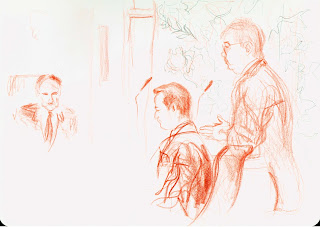In real life, an artist has to draw such scenes from memory. This was not a plot line but a collective mistake. The subject of the picture is the alleged victim of sexual abuse so she would not be portrayed anyway, even from memory. It has led to complaints to Ofcom and apologies from Corrie chiefs.
This is Lady Hale's first session as President, joined by two of the three new Justices, Lady Black and Lord Lloyd-Jones. All is serene on the bench while courtroom nerves are about normal: just before the second half, a lawyer breaks a glass. Symbolists would say this represents a ceiling.
The usher emerges cheerfully from behind the scenes: 'Did someone make an impact in there? Everything OK? I've seen a lot worse.' He sorts everything out.
The appellant, who in 2010 was the first barrister to become a partner in a legal disciplinary practice, is here to observe. Daphne Evadne Portia O'Connor v Bar Standards Board asks whether, in a claim that a prosecution breaches human rights, the time limit for bringing proceedings under the Human Rights Act 1998 runs from the date of acquittal/conviction or the date on which any appeal is concluded. And was the High Court judge right to conclude, for the summary judgment application, that Portia O'Connor's claim of indirect discrimination under ECHR had a realistic prospect of success?
Counsel are softly-spoken. Lady Hale reminds them: 'The first duty of any advocate is to be heard,' adding that the microphones are mainly for recording and transmission, with only a small amount of amplification.
'I can't hear anything,' says the woman behind me. She adds, 'They are all beautiful,' referring to the row of students in front of us, and leaves.
Outside, another bench, another beginning.












No comments:
Post a Comment